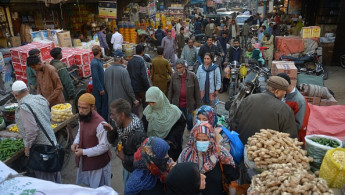Pakistan inflation spikes as IMF standoff continues
Inflation in crisis-racked Pakistan has jumped 31.5 percent according to state data published Wednesday, as Islamabad continues to stare down IMF negotiators withholding a crucial bailout.
Year-on-year inflation for February is the highest in decades, while transport and perishable food costs rose by around half as a cost-of-living crisis continues to bite.
"The 30 percent figure is where families will have to make choices and sacrifices," analyst Torek Farhadi told AFP.
Years of financial mismanagement and political instability have pushed Pakistan's economy to the brink of collapse, exacerbated by a global energy crisis and devastating floods that submerged a third of the country in 2022.
The nuclear-armed nation's forex reserves have dwindled to just $3.25 billion - enough for around three weeks of imports - paralysing supply chains and causing widespread factory closures.
Will Saudi Arabia steer Pakistan out of its economic quagmire?
— The New Arab (@The_NewArab) January 18, 2023
✍ @sabena_siddiqi https://t.co/J0uo7jCYsI
To pull the country out of its spiral, Prime Minister Shehbaz Sharif is battling to revive the next tranche of a $6.5 billion loan deal sketched with the International Monetary Fund in 2019.
However the global lender is demanding stringent reforms including tax rises and subsidy slashing, likely to rile voters ahead of a general election due no later than October.
Last month IMF negotiators flew to Pakistan for a 10-day visit, but went back to the US without sealing a deal.
Islamabad insisted the two sides were on the brink of hammering out terms but the loan has yet to be unlocked.
"The average people pay the price for the packages that the big boys negotiate," Farhadi said.
Analysts say inflation is expected to rise even after a deal has been reached.





 Follow the Middle East's top stories in English at The New Arab on Google News
Follow the Middle East's top stories in English at The New Arab on Google News


